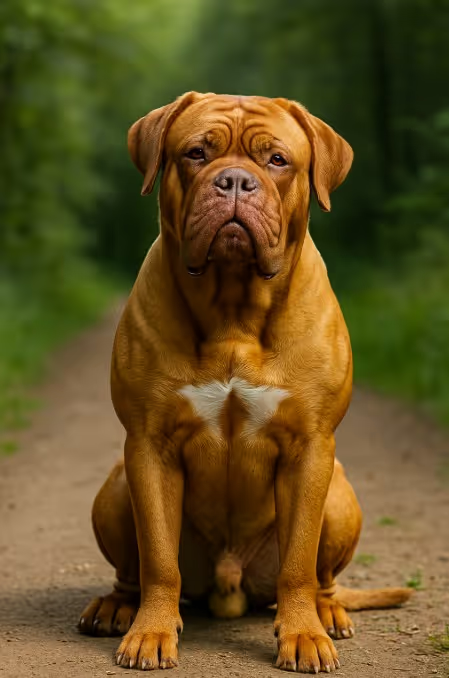The Dogue de Bordeaux, also known as the French Mastiff, is a loyal and affectionate giant breed known for its powerful build and deeply expressive face. Despite their intimidating appearance, they are gentle and loving with their families—making them excellent guardians and companions. Best suited to experienced dog owners in spacious homes, the Dogue thrives with calm leadership and daily companionship.

The Dogue de Bordeaux is one of France’s oldest breeds, dating back to at least the 14th century. Originally bred as a guard dog, war dog, and hunter of large game, the breed was historically used for pulling carts and protecting estates. After nearly going extinct during the 20th century, breed enthusiasts revived its numbers. The Dogue de Bordeaux gained fame in North America after appearing in the 1989 film Turner & Hooch.
Massive and muscular with a broad head and signature wrinkled face.
Low-maintenance coat, but facial wrinkles require special care.
Moderate exercise needs, but avoid overexertion in heat.
This breed is intelligent but strong-willed—early and consistent training is a must.
Large breed with a tendency to gain weight—portion control is essential.
Shortened lifespan and predisposition to several large-breed health issues.
Work with breeders who prioritize health and temperament—or consider breed-specific rescues.
Are Dogue de Bordeaux good apartment dogs?
They can adapt to apartments if provided enough space and daily walks, but thrive best in homes with yards.
Do Dogue de Bordeaux drool a lot?
Yes—heavy droolers, especially after eating, drinking, or exercise.
Are Dogue de Bordeaux hypoallergenic?
No. They are not hypoallergenic.
Do they get along with kids and other pets?
Yes—with proper socialization, they’re calm and protective with children. Supervise around smaller pets.
How much exercise does a Dogue need?
About 30–45 minutes daily; avoid strenuous activity in hot weather.
Do they bark a lot?
Not excessively, but they are alert and may bark to warn of intruders.
Are Dogue de Bordeaux aggressive?
Not typically, but they are protective and require early socialization and training to prevent territorial behavior.
Do they require a fenced yard?
Yes, secure fencing is important due to their protective instincts.